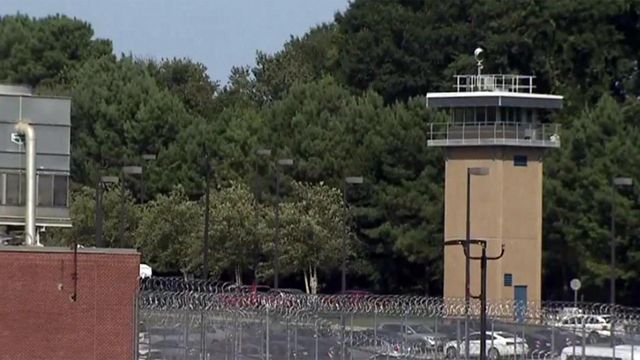In NC prisons, inmates much more likely than staff to take vaccine
People serving time are also a little more likely to take the shot than North Carolina's general population, but rates vary widely by facility.
Posted — UpdatedThe differences aren’t necessarily surprising, but advocates worry that the group most likely to bring coronavirus into a prison – corrections workers – are significantly less likely to get the shot.
Systemwide, 63 percent of people incarcerated were vaccinated as of this week, according to the state Department of Public Safety, compared with about 50 percent of prison staff. About 57 percent of North Carolina adults are fully vaccinated, according to state Department of Health and Human Services numbers.
Vaccination rates among both prisoners and staff vary widely at the system’s 55 facilities for reasons that aren’t always obvious.
"What we're finding is a lot of people have their own reasons,” said Dr. Les Campbell, the prison system’s medical director. “Unfortunately, a whole lot of things have been interjected into this argument. It's way more political than it should be."
Campbell also said a “fair number of people” have already had COVID-19 and feel like they don’t need to get the vaccine.
There are also disparities between minimum- and maximum-security facilities, likely because there are more things inmates in lower-security settings can do if they’re vaccinated. With higher security, “you're not going to be able to do a lot anyway,” Campbell said.
There’s also a snowball effect, Campbell said: If vaccination gets momentum, that momentum tends to grow.
“If you have a population of people that are, you know, offenders in a prison that aren't getting vaccinated, they tend to ... do the same thing as other people,” he said. “Whereas, if you have a prison where offenders are highly vaccinated, they tend to kind of go along a little more and get vaccinated.”
As for staff, Campbell said their hesitancy tends to reflect the surrounding area, where they typically live. That’s difficult to tease out of the numbers, though. In some counties, prison staff vaccination rates far outstrip the county’s rate. In others, it’s well below, while in still others, they’re just about the same.
In all but five counties, staffer vaccination rates outpace the county where the facility is located.
The North Carolina chapter of the American Civil Liberties Union called prison staff vaccination rates “very concerning, given that they are the primary vectors for COVID-19 outbreaks in the state prisons and jails” and questioned whether the prison system is doing enough to ensure staff are vaccinated.
State prison guards already are required to wear masks, though advocates say the mandate isn't always followed, and unvaccinated prison staff are tested every two weeks, according to Department of Public Safety spokesman John Bull.
Masking is required for prisoners and staff regardless of vaccination status, but Whitley Carpenter, staff attorney for an advocacy group called Forward Justice, said her group hears from incarcerated people that staff don’t always follow the rule.
“They don't know if the staff members that they're around are vaccinated or not,” Carpenter said. “They just know that they don't have on a mask. … If the Department of Public Safety won't require the vaccine for staff who are going to be working directly with incarcerated people … they should, at the very least, fully enforce that mask requirement.”
Bull stressed the low infection rates right now at state prisons and the efforts undertaken. Along with routine testing and vaccination education programs, the prison system installed ionizing equipment meant to remove the virus in heating and air systems at every facility in the state.
Bull said this week that there are about 25 positive cases right now, at five facilities. More than 28,500 people are incarcerated system wide.
Sixty-one staffers are off the job due to COVID-19, he said, out of 13,500 employees.
Related Topics
• Credits
Copyright 2024 by Capitol Broadcasting Company. All rights reserved. This material may not be published, broadcast, rewritten or redistributed.






